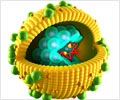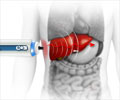Genetic markers of patients with cirrhosis from hepatitis C virus could help to predict the improvement after Hepatitis C treatment.

‘Genetic markers may help to predict improvements after hepatitis C treatment and reduce the need for liver transplants.’





"Our findings further the move toward precision medicine, because we can potentially use a person's genetic makeup to identify individuals who can benefit most from hepatitis C treatment, even at a very late stage in the progression of their liver disease," said Winston Dunn, MD, the study's lead author and associate professor at the University of Kansas Medical Center.Most patients with hepatitis C virus (HCV) can be cured by direct-acting antiviral agents, but some of those with the more serious decompensated cirrhosis, or liver damage, fail to improve or experience further deterioration even after treatment. Features of decompensated cirrhosis include confusion, swelling and jaundice.
Dr. Dunn and his team focused on the Rs738409 single nucleotide polymorphism (RSP), which is a variation in a single base pair of DNA in the PNPLA3 gene; patients possess one of three genotypes -- CC, CG, or GG. The PNPLA3 gene is the most important genetic risk factor for both alcoholic liver disease and nonalcoholic fatty liver disease.
The team followed 32 patients with decompensated cirrhosis at the University of Kansas Medical Center who had initially achieved sustained virologic response (SVR). They had become essentially virus-free, using interferon-free direct-acting antiviral medications, such as sofosbuvir/ledipasvir and sofosbuvir/simeprevir. Twelve to 48 weeks after SVR, researchers tracked changes in two measures that assess the severity of chronic liver disease, the Model for End-Stage Liver Disease (MELD) and the Child-Pugh (CPT) scores.
Following the antiviral treatment, researchers found that five of the 16 patients with the CG or GG genotypes experienced worsened MELD or CPT scores. In comparison, only one of the patients with the CC genotype worsened in either CPT or MELD scores.
Advertisement
As next steps, Dr. Dunn noted that his team will examine the underlying mechanisms that may explain why the presence of these genotypes lead to worsened health outcomes. They'll study how fatty liver and insulin resistance impact clinical recovery after treatment with direct-acting antiviral medications, and if these findings correspond to that of the genetic marker for fatty liver (Rs738409).
Advertisement
Source-Eurekalert















